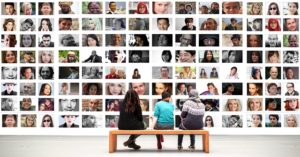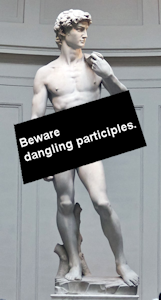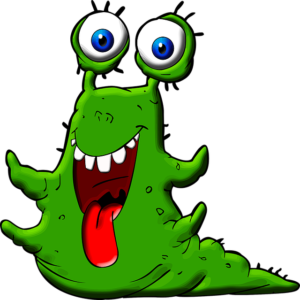
Make your characters realistically diverse.
While the waitress who serves your main character (MC) coffee halfway through the book doesn't need a past, a future, or even a name, you can't skate over character creation for more prominent ones in your story. The main characters and supporting characters need to be real people (or real elves, orcs, aliens, vampires, oozes, etc.) Real people have histories, futures, positive and negative traits, and a whole bunch of other stuff that may not even make it into your book.
A Note on Diversity
Diversity is good. People (unless they're bigots) like diversity. Anyone can write a diverse cast of characters as long as they do some research.
I personally do NOT agree with the idea that you cannot write a different ethnicity, religion, gender, sexuality, level of ability unless you are that thing. I write dragons, murderers, people from other planets. I'm none of those things. (No, I'm not equating people different from me with murderers and dragons. THe point is... you don't have to "write what you know." You have to LEARN so you know what you write.)
Research. Learn. Avoid cliches and stereotypes. Don't try to tell someone else's story.
Talk to people from the group you're trying to represent and listen to them!
The rules about diversity follow all other writing rules: if it serves the story, it's all good.
NO! This does not mean that race, sexuality, disability, whatever can only exist as a plot device or point of conflict. No character needs a reason to be Black, blind, gay, etc. They just are! Just like real people in the real world are. What it means is that every characteristic has to be used effectively and properly in the story. If you don't realize a Black, blind, gay person will have a different experience than a white, seeing, straight person... get out more!
Adding diversity to your stories does not mean running down a checklist to make sure you have one white person, one black person, one person with a disability, one gay person, one etc. etc. etc. If you don't recognize that these people exist in the real world, get out more. Then you will be better equipped to write a diverse range of characters into your stories.
Character Archetypes
Archetypes are templates or psychological profiles of different types of people that form the basis for most characters.  This does NOT mean the characters are cardboard, two-dimensional, all alike, or boring.
This does NOT mean the characters are cardboard, two-dimensional, all alike, or boring.
Archetype =/= Stereotype!
Things like a tough guy with a soft side or the hooker with a heart of gold are archetypes. The classic alpha male is one of the most popular, especially in romance fiction.
A reason to learn about and use archetypes is that they are based on real people who exist in our world. Their feelings, thoughts, experiences, and reactions are things that many people can relate to, even if the character themselves is quite unusual. Understanding a bit about the psychology behind these classifications helps you create richer, more nuanced characters without losing the automatic empathy readers should get when they read.
How to Use Archetypes?
Whether characters come to you (mostly) fully formed, or you create them in response to a plot idea, archetypes still help you figure out expected and acceptable behaviors, thought patterns, and emotions. Characters have to make sense, even if they are delusional or alien, or the reader will not connect.
- Choose or label your character with an archetype
- Empathize and understand WHY they act, think, feel the way they do
- Spin stuff so your characters aren't cookie-cutter or cardboard
The last thing you want (usually) is a stock character who is just like every other instance of that archetype in books or other media.
Here are 5 main types of character archetypes. They each have many sub-types underneath the categories. They each have good and bad potential.
Hero / Villian
-- A main character
-- Has a goal, desire, and obstacles in the way
-- Particular strengths that make them good at what they do
-- Inspires an emotional response (either rooting for or against them)
-- Harry Potter / Voldemort
Mentor / Fool
-- Supporting character to the hero or villain usually
-- Serves as a guide / Creates distractions
-- Serious / Frivolous
-- Makes the reader think / Suspends heavy thinking as comic relief
-- Gandalf / Pippen
Ordinary person (everyman/woman) / Master or Magician
-- Supporting character or source of conflict
-- Goes along with the flow / Tries to impose will on reality
-- Does not create change / Makes things change through abilities
-- Dr. Watson / Sherlock Holmes
Innocent / Rebel
-- Could be main (if they change) or supporting characters
-- Optimistic and child-like / Knows the harsh reality of life
-- Morally good / Morally questionable or "ends justify the means"
-- Powerless but enthusiastic / Powerless but resourceful
-- Dorothy from Oz / Katniss Everdeen
There are many more archetypes depending on the resource you look at or book you read. With every type and most examples I give above, there is so much more to the character than just the archetype. Readers can know them quickly, but still get surprised sometimes by what they can do.
Main Characters
Every story has one or more main characters. These are the people (or whatever) who own the story. It is theirs. They are usually the point of view characters if you write in first or close third person. They're involved in all or most of the plot arc and the character arc.

Readers need to connect with the main characters more than any others. Connect does not mean like, sympathize with, or root for. It's more like empathy. If the reader cannot either sink into the main character or stand alongside them, there is a disconnect between the real world and your imaginary world, and that ruins the transportive excitement of any story.
Supporting Characters
Supporting characters are sidekicks, either permanent or temporary, who do something to support the main character's story arc. They are not telling their own story. Instead, they are helping the main character tell theirs.
They frequently have one or two set roles they play for the main character: a mentor, best friend and confidant, a catalyst for action, or even someone who stops them or gets in the way. If you find yourself with too many minor characters, consider combining one or two. The best friend and confidant could also be a mentor, for example.
Of course, there are also incidental characters who are like extras in a movie. In a shootout, they run for cover and scream. On a romantic first date, they bring the wine list or bump the main character's chair and ruin everything. They have no or limited personality.
These people do not need names, backstories, or goals. They are more like minor plot points than people.
Character Names
Baby Name Sites
1 - Baby Names
2 - Baby Center
3 - Nameberry
Census Records for Specific Years
1 - SSA Popular Names
Name Meaning and Etymology
1 - Behind the Name
2 - Belly Ballot
Some people use the names of people they know. Others thumb through virtual phone books. I've even heard of people use names from spam emails they get.
Another option is name generators that give you random lists.
1 - Name Generator
2 - 7th Sanctum (the most awesome generator site ever)
You may be tempted to pick your favorite name for your main characters and just go with that "just because." This works fine, for the most part, if you are writing contemporary fiction. In real-world stories (See the next tab for fantasy and science fiction.), people have real-world names, which makes choosing them easier.
There are still some guidelines to follow if you want to maximize reader enjoyment.
1 -- Pick names from your book's time period.
2 -- Limit unusual names to one or two characters.
3 -- Use names that sound different and start with different letters to avoid confusion.
4 -- Avoid offensive names unless the intent is to be offensive.
5 -- Try not to hit readers over the head with name meanings.
I wrote a more in-depth guide to naming characters on my blog.

Hi! My name's Jayson Sih'whtoo'yzhlia Smith III
Besides the main issues to avoid listed in the other tab, fantasy and science fiction names have a few more rules. Fantasy writers (I am one!) sometimes eschew rules, but if your goal is to make readers like your story, you have to make it easy for them to do so.
1 -- Make sure fans can pronounce them.
2 -- Avoid overly long or complicated names that make a reader pause.
3 -- Have them fit your world. Medieval-style fantasy probably won't have someone named Quark or Jaxton.
4 -- Avoid Earth-specific names unless you actually have Earth in your story. No characters named Paris, Kenya, or Brooklyn.
Besides making them up from scratch, fantasy or sci-fi name generators are great sources for character names.
Making 3D Characters Real
Every character comes from somewhere, even if you write someone with total amnesia. There has to be some frame of reference that affected how and why they turned out the way the did.
The character's history is often NOT revealed directly in a story. Readers do not need to know that Joe was a star basketball player who once scored 50 points in a championship game in high school. However, the fact that sports fans in town still remember that, or he still feels the pull of his glory days can still have an influence on how he is treated and what he thinks of himself.
Character Histories Can Include:
-- Family structure and relationships
-- Old friends and lovers
-- Education and work history
-- Extreme (or mundane) events they lived through (both personal and news-worthy)
-- Values, beliefs, and how they changed (or didn't change) over time
How Do You Create a History?
You can come at this from two different directions.
What history do I want my character to have?
OR
What history is necessary to make my character act and react in this way now?
The first question works if you do not have a strong view of who your character is yet. You might have picked a type of character (strong, serious businessman OR shy, artistic teenage girl, etc.) but you do not know them as a person yet. They're a cardboard cutout.
The strong, serious businessman would turn out quite different if his parents were illegal immigrants who had been deported when he was 10, he barely squeaked through University, and his first fiance had died in a horrible car accident, than if he was the son of old-money suburbanites, he had a free ride merit scholarship to Yale, and he had parted ways amicably with his ex-fiance when their life plans diverged too much.
OR... you can create the history based on what you want the character to be like in your story. This requires some knowledge of psychology and human behavior, ideally, but at least a double helping of empathy. For example, bullies bully because they were bullied and they want to feel strong or important. A person who keeps choosing the wrong lovers who treat them badly may have self-esteem issues. Like it or not, there are some generic truths about human behavior that do apply to most people.
Strive to stay away from the obvious and the ordinary. Avoid cliches. Common "whys" exist for good reason: they are actually common. But there can always be more.
How Detailed Do You Have to Get?
That depends. Is your character still haunted by something from their past? Is their personality tainted by extreme treatment when they were growing up or coming of age? If your book is ABOUT things like this, you need a full history. If it's about something else, you might only need to know so you can flavor their actions, interactions, and reactions to other characters and events.

This character is brooding, socially anxious, and angry. Will he change or not?
Every single person on Earth has strengths, weaknesses, and faults. (There is no reason to believe that most other sentient species in other worlds wouldn't have them too.)
When you create a main or secondary character for your story -- or when they show up in your head and you start learning more about them -- take some time to jot down their strengths and weaknesses. These can be physical, mental, or emotional. They all have a source if you want readers to believe in them.
Character Strengths
These positive characteristics help the character through the story toward their goal. They can also help other characters along the way.
Some examples include:
- (Physical) Strength, dexterity, agility, speed, dance skills
- (Mental) Intelligence, common sense, craftiness, humor, amazing memory
- (Emotional) Optimism, self-confidence, caring personality, fairness, generosity.
Character Weaknesses
These are usually just the opposite of strengths. A person can be physically strong or physically weak. They can be kind to most people or treat everyone as an enemy. Sometimes things that could be strengths are actually weaknesses because they are excessive. Excessive optimism may get in the way of understanding reality.
For the main characters, these are the things they should overcome (at least partially) during the course of the book. If the character starts out an unfeeling hardnose, she could transform into a caring individual in her character arc.
Character Faults or Quirks
Weaknesses are considered faults, but these faults or quirks do not get in the way of the character achieving their objective. I personally think it's more interesting if they learn something about themselves and overcome faults, but quirks just color their world and story.
Some examples include:
- Alcoholism, using drugs, eating only one type of food, sucking on a lollipop
- Flirting with everyone, extremely loyal, over-sexed, prudish
- Tells white lies, unreliable, forgetful, timid, socially awkward
- Clumsy, lazy, frenetic, bouncy
As you can see, quirks range from the quite serious to the super fluffy. No one in the real world would call alcoholism a quirk. That's just the word I use for unique characteristics that affect characters.
In books where sexuality is not a major plot point, it can theoretically be considered a quirk. It is a character trait that may color their interactions with others, but should not disrupt their ability to function in the story. Definitely not one to "get over!"
Every sentient being has dreams and goals. Every main character in your stories should have them, too. They do not have to be grandiose, life-changing things. They just have to exist as a reason for your character to do things. A character without any goals is static, unchanging, and boring.
Character Dreams and Motivations
These things have more to do with characterization and how the character acts than what they do in the story. This isn't about your fantasy hero seeking out the magical sword, your young professional woman looking for love, or your retired detective looking for a murderer and redemption.
They do, however, touch on all those things. What your character dreams of provides motivation to go after their main external and internal goals.
Character Goals
Goals come in two main varieties: external and internal. External goals are also called story or scene goals. These are the things a character actually wants to get or do. It could be as complicated as a lifelong love, recognition during a complex business deal, or a king's murder. It could also be as simple as a smile from their child, a raise at work, or a glass of water.
How do dreams, motivations, and goals work together?
Mary remembers how lovingly her father treated her mother before she died from cancer. She dreams of having someone who loves her just as much. That sense of being special and cherished is her motivation. The goal? To meet a man with great qualities who loves her. When she is introduced to an attractive and friendly man, her scene or short-term goal is to get an introduction and gauge their compatibility.
Jackson's father had to sell his corner store when racist property owners drove him out of the neighborhood. He dreams of reclaiming the family business and being accepted there. His motivation comes from justice and family pride. The goal? To acquire a mortgage for the retail space and show the community how acceptance is the better path. When he finally opens the store again with a grand-opening celebration, his scene goal focuses on showing the bigot's family members that their way won't work anymore.
